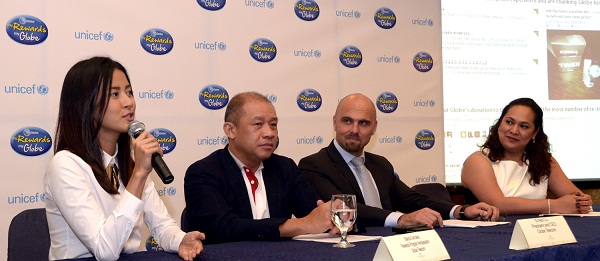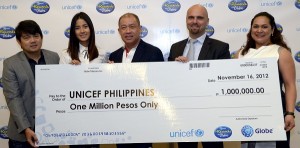Mobile phones boost mother, child health care in 8 PH areas–UNICEF

Globe Rewards Program Ambassador TV personality Bianca Gonzalez, Globe Telecom President and CEO Ernest Cu, UNICEF Philippines Chief of Health and Nutrition Willibald Zeck, and Globe Head of Customer Lifecycle Management Jay Beltran. UNICEF
MANILA, Philippines — Mobile phones will scale up the initiatives to monitor maternal and child health care in eight poor municipalities in the Philippines, an official from the United Nations Children’s Fund (UNICEF) said.
Willibald Zeck, Chief of Health and Nutrition of UNICEF Philippines, said that with the P1 million worth of mobile phones and subscriptions donated by telecommunications company Globe, more health stakeholders — mayors, heads of health teams, health administrators and national policymakers— “can now access real-time information and use that in making key decisions to improve the health and welfare of their citizens.”
Zeck emphasized that adopting innovative techniques in monitoring health care data was very crucial, especially in the Philippines where the system of writing enormous data on paper or cards posed a significant challenge to a system in need of cohesive, relevant and timely health information critical to decision-making.
“There are about 42,000 barangay [villages] and about as many rural health units in the country. Typically, health data collection and consolidation is still done manually, which makes it prone to human error and also often results in delay that renders the generated information almost stale and irrelevant,” Zeck said.
The project is part of the on-going real-time Community Health Information Tracking System ((rCHITS) project, the country’s first electronic medical record system for government health facilities which enables nurses and midwives nationwide to help generate health data and timely reports for the Department of Health’s (DOH) health programs by using their mobile phones.

Globe Telecom turns over a check donation amounting to P1 million to UNICEF as part of its My Rewards My Globe campaign that allowed Globe subscribers to redeem Globe rewards at 50% off. The donation will be used by UNICEF to fund its Maternal and Newborn Health program. Leading the ceremonial turnover are Globe Telecom President and CEO Ernest Cu (center) and UNICEF Philippines Chief of Health and Nutrition Willibald Zeck (second from right), together with (from left) Globe Head of Corporate Social Responsibility Rob Nazal, Globe Rewards Program Ambassador TV personality Bianca Gonzalez, and Globe Head of Customer Lifecycle Management Jay Beltran.
“The project provides a real-time social monitoring system to bridge information gaps by making data entry more efficient through mobile phones, faster record retrieval, shorter waiting time for patients, and more time for health workers health service,” Zeck said. It was launched by UNICEF, Globe, and University of the Philippines-Manila National Telehealth Center early this year.
UNICEF said that though it has yet to identify the eight additional municipalities that would benefit from the program, it aims to cover 30 municipalities in the country. It had initially identified three “disadvantaged areas” – G’lan in Sarangani, Sto. Domingo in Albay and Gamay in Northern Samar – that were equipped with mobile phones and special Globe Bridge Com SIMs to give the rCHITS program leaders access to more affordable mobile services for data gathering in rural areas.
The support from Globe Telecom also includes the TEXTCONNECT facility, a web-based service which enables transmission of high-volume text broadcasts, to aid sustainability for program replication and future implementation on a larger scale.
Zeck, in his speech, underscored the importance of maximizing the use of information and communication technology (ICT) tools, saying that “rapid increase in users of mobile phones and personal computers, even in developing countries, has afforded governments and social planners new opportunities to collect, share, analyze and act on available data.”
“The funding support will provide more phones and unlimited subscription for SMS and calls to Globe lines for the duration of the project for the permanent health workers, day care workers, and other partners; new hard – and software and capacity building for technical support to enhancement the system in pilot areas to improve monitoring and to ensure that the system is maintained,” said Zeck.
“Together, through partnership and innovation, we can work towards making preventable mother and child deaths a thing of the past and give each and every mother and child an equal opportunity to survive,” Zeck added.
More needs to be done to reduce maternal, child deaths
Zeck also noted that the Philippines has made significant improvements in reducing child deaths, saying that the country reduced its child mortality rate from 57 per 1,000 live births in 1990 to 25 per 1,000 live births in 2011.
“This is good news but at the same time, there are still 190 children under five who die every day in this country from preventable causes,” Zeck said.
He said that in the Philippines, “it was the story beyond the national averages that is most revealing,” as he noted that children from poor rural areas are much more likely to die before their fifth birthday than those in urban areas.
He said there were substantial differences seen across the country as he cited that a child born in the Autonomous Region in Muslim Mindanao (ARMM) woukd be four times less likely to reach their fifth birthday as one born in Metro Manila.
“We need to ensure that all children – no matter where and to whom they are born – survive and thrive,” said Zeck.
Citing statistics from the DOH’s 2011 Family Health Survey, Zeck revealed that at least 13 Filipino mothers die each day from birth-related complications such as hemorrhage and lack of access to professional midwives or doctors during giving birth.
“Although these statistics are alarming, the good news is that we collectively have the knowledge, tools, treatments, and technology to save millions of lives every year,” Zeck said.
Zeck called on stakeholders to give importance to health interventions, particularly inexpensive solutions — vaccines against measles and polio; oral-rehydration salts and zinc to treat diarrhea; antibiotics for pneumonia; oxytocin preventing women from bleeding to death after childbirth – to prevent the causes of the diseases.
He also said said that aside from health interventions, access to improved water and sanitation, hand washing with soap, better nutrition for mothers and babies were also crucial in preventing the needless deaths of countless women and children.
“Education is another part of the equation. A child born to a woman who can read is much more likely to live past his or her fifth year birthday than one born to an illiterate mother. Every extra year of a mother’s schooling reduces the probability of an infant dying by up to 10 per cent,” he added.